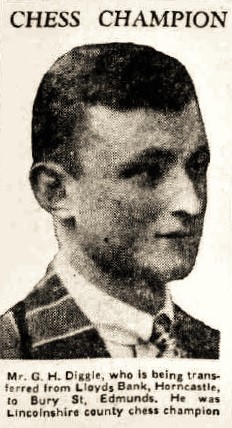
Edward Winter
In the Preface to his first anthology of articles, Chess Characters (Geneva, 1984), G.H. Diggle wrote of himself:
‘The “budding author” (aged 81) awaits his fate with some trepidation. To paraphrase Oscar Wilde, “he has nothing to declare but his longevity”. However, he has now mingled from time to time with three generations of eminent players ranging from Isidor Gunsberg to Nigel Short, and rambled extensively round the highways and byways of provincial chess. It is in these obscure haunts, as well as in the higher circles, that he has observed great Chess Characters and overheard many weird chess utterances faithfully reproduced in these pages.’
As will be seen below, he was awarded the title ‘Badmaster’ by C.H.O’D. Alexander, who also described him as one of the best writers on chess that he knew.
***
The first volume of Chess Characters has this autobiographical note, written in the third person:
‘Geoffrey Harber Diggle, born at Moulton, Lincolnshire on 6 December 1902, the only son (with two sisters) of a land agent. Educated at Spalding Grammar School. Entered the Lincoln Branch of Lloyds Bank, 1921 – transferred to Horncastle 1925, Bury St Edmunds 1932, Luton 1936, Executor & Trustee Department, Chief Office 1940. Joined the Forces (R.A.O.C.) 1942, serving mainly at Olympia (then used as an Ordnance Depot) with rank of Sergeant. Demobilized in 1946, rejoined Lloyds Bank and was appointed to the Trustee Department, West End Branch, St James’s Street. Retired from the Bank in 1965, then worked part time for a London firm of solicitors until 1982, specializing in Capital Gains Tax. Married in 1945 and has two sons.
First learned chess at age of 12 at Spalding Grammar School (where 1 P-K4, 2 Q-R5 was “book”). In 1921 he joined the Lincoln Chess Club, won the Lincolnshire Championship 1931 (a knockout Tournament), played successively for Bury St Edmunds and Suffolk, Luton and Bedfordshire, later (1944-45) for West London and Lud-Eagle clubs, and finally (1946-69) for Lloyds Bank in London Banks Chess League. First and last appearance in “Big Chess” was in the London Championship (Knockout) Tournament 1945, where through the luck of the draw he was one of the eight finalists who then played (American system) with three seeded experts. His score was 1 win 2 draws 7 losses. He was given the afternoons off to play by his Commanding Officer, whom he encountered in the Depot halfway through the Tournament and who greeted him as follows: “Look here, Sergeant! I give you time off because you come to me with some Cock and Bull story about wanting to play in some Masters’ Tournament with Sir George this, and Doctor that, and I hear you haven’t won a single game! I’ve a good mind to put you on a charge for malingering. I DON’T BELIEVE YOU’RE A CHESS MASTER AT ALL!!”
This perhaps sums up the BM as a player. As an antiquarian his interest in Chess History started in 1918 when he got hold of Staunton’s Handbook and Companion, and he has been fascinated by the Staunton Period ever since. He started taking the BCM in 1925 and has contributed occasional articles up to the present date, i.e. Pierre Charles Fournié de Saint-Amant (October and November 1933), the La Bourdonnais-McDonnell Matches of 1834 (July 1934), British Chess Journalism in 1836 (August 1936), A Crisis in 1851 (February 1940), Staunton v St Amant, 1843 (November and December 1943), Howard Staunton – A Muffled Peal (August 1951), British Chess Magazine – A Reader’s Retrospect (January 1955 – 75th Anniversary number), English Chess before Morphy (July 1958), The Morphy-Edge Liaison (September 1964), George Hatfield Dingley Gossip – The Master Who Never Was (January 1969), Johann Jakob Löwenthal (July 1976), and British Chess Periodicals of the Nineteenth Century (December 1980 and January 1981). He contributed a biography of Anderssen to World Chess Champions, edited by E.G. Winter (Pergamon Press, 1981). His Chess Library comprises mainly Nineteenth-Century volumes, including books originally owned by William Lewis, George Walker, J. Rimington Wilson and the dramatist Clifford Bax.’
From page 1 of the Lincolnshire Echo, 6 October 1932:

(9070)
In the Preface to the first volume of Chess Characters, G.H.D. explained his nom de plume:
‘In 1949 the writer created a record in London Banks League Chess by losing a game in seven moves (for details see article 49). Later he sent the score on a Christmas Card to the late C.H.O’D. Alexander who, with a flash of genius, sent a card in return awarding him the title of “Badmaster”.’
‘Article 49’ was ‘Memorably bad games’ (C.N. 7947).
Also in that Preface, dated May 1984, G.H. Diggle related how his column had come about:
‘Up to 1974, Newsflash, then edited by Ann Hopton, the Secretary of the British Chess Federation and herself no mean writer, had long been running a column by D.J. Morgan. This he was finally forced to give up, whereupon Mrs Hopton asked “C.H.O’D.” if he would fill the gap with a new column. But having himself too many irons in the fire (most unhappily he died shortly afterwards) he paid the Badmaster the compliment of suggesting his name. Mrs Hopton invited the BM to send in a piece “on appro”, which she accepted (see July 1974) but gave him the excellent advice to drop the grandiloquent “we” and write in the third person. This he has done ever since, contributing intermittently until May 1976 and monthly thereafter.’
The first article (July 1974) is reproduced not only in volume one of Chess Characters but also in C.N. 8413.
From a review of Chess Characters in a 1984 book-list issued by Dale Brandreth:
‘Diggle is familiar to readers of the BCM, but may not be so well-known to others. He certainly should be, however, for his columns are among the most entertaining I have ever read anywhere. ... It has been a long time since I read anything so entertaining in the chess world.’
(850)
Below is our tribute to G.H.D. on page 46 of CHESS, June 1993:
‘Geoffrey Harber Diggle (born in Moulton, Lincolnshire on 6 December 1902) died in Brighton on 13 February 1993. Affectionately christened the Badmaster by C.H.O’D. Alexander (who also described him as “one of the best writers on chess that I know”), G.H.D. contributed many fine articles to the BCM (1933-81) and the BCF’s Newsflash and Chess Moves (1974-92).
Specializing in nineteenth-century chess history (particularly the Staunton period), he brought the old masters to life with rare wit and shrewdness. These qualities also permeated his accounts of the idiosyncratic doings and sayings of club “characters”, such as the elderly player “who fumbled his way to perdition at reasonable speed until he was a queen and two minor pieces to the bad, after which he discovered that ‘every move demanded the nicest calculation’”, or “the Lincoln bottom board of 1922, who complained that he had ‘lost his queen about the third move and couldn’t seem to get going after that’.”
A former county champion, G.H.D. was charmingly self-deprecatory in his reminiscences, as when he had a game adjudicated by Tartakower: “The Great Master, having been fetched, sat down at the board very simply and unaffectedly, and drank in through his spectacles the fruits (and probably the whole deplorable history) of the Badmaster’s afternoon strategy.”
Little escaped G.H.D.’s eye, even towards the end. Modestly adapting Oscar Wilde, he claimed to have “nothing to declare but his longevity”, simply adding that he had “mingled from time to time with three generations of eminent players ranging from Isidor Gunsberg to Nigel Short, and rambled extensively round the highways and byways of provincial chess”. He was one of the game’s most stylish chroniclers.’
C.H.O’D. Alexander’s praise is on page 138 of A Book of Chess (London, 1973).
We published two anthologies of G.H.D.’s articles under the title Chess Characters Reminiscences of a Badmaster (Geneva, 1984 and 1987), and have placed many of them on-line: C.N.s 4184, 4337, 4554, 4706, 4984, 5016, 5061, 5316, 5317, 5369, 5467, 5540, 5861, 5950, 6046, 6121, 6421, 6491, 6538, 6761, 6837, 6952, 7018, 7045, 7089, 7102, 7175, 7223, 7293, 7331, 7369, 7425, 7473, 7512, 7551, 7613, 7669, 7705, 7729, 7750, 7775, 7805, 7854, 7895, 7947, 7973, 7999, 8048, 8075, 8091, 8134, 8229, 8323, 8377, 8413, 8448, 8794, 8930, 11166, 11353.
From page 78 of the first volume of Chess Characters by G.H. Diggle (Geneva, 1984), in which he referred to himself in the third person as the ‘BM’ (‘Badmaster’):
‘One of the BM’s earliest opponents was an eccentric but versatile Spalding lady some 50 years his senior, who for some fantastic reason was absolutely fascinated by the names of the Openings and who would turn over the pages of the BM’s MCO as though it were a picture book. She would even get the BM to go through with her the first three or four moves of any opening with a name that particularly “turned her on”, such as the Giuoco Piano or what she called the Kaiseritzky Gambit. Her main chess ambition was not to win a game (which she was shrewd enough to perceive would never happen) but to play an opening with a good resounding title, which gave her the same feeling of accomplishment as that of a ballroom dancer who had just performed the “Mayfair Quickstep” or the “Royal Empress Tango”. In her quest for additional strings to her bow she once discovered the “Max Lange” (16 columns including innovations from Marshall and Tartakower) and on being informed that Lange was a deceased nineteenth-century Master remarked that “he must have had a brain to have invented all that”.’
Even so, the Spalding lady’s delightful belief about Max Lange’s brainpower is less naive than the misapprehension of various newspaper and magazine editors that the chess columnist/correspondent on their payroll requires any time, let alone special grey matter, to fabricate his daily or weekly feature when it largely consists of bare (or barely annotated) game-scores which can be downloaded by anyone at the press of a button.
(3671)
From page 14 of our publication Chess Characters, volume two by G.H. Diggle (Geneva, 1987) we present another article by the ‘Badmaster’ (BM), originally published in the January 1985 Newsflash. It will be recalled that G.H. Diggle (1902-93) wrote of himself in the third person.
‘The December Newsflash quotes some highly interesting remarks from various learned sources on the alleged inferiority of women chessplayers, who it appears are subject to “biologically programmed ‘interrupts’ which prevent them from concentrating on an intellectual task effectively”. The Editor, with superhuman courage, has actually invited readers’ comment.
The BM considers himself admirably qualified to educate the chess public on this subject, having spent a whole afternoon at the BCF Congress last August watching the grandmasters and grandmistresses of tomorrow, i.e. the “Under Elevens”. There were 16 boards in action, manned mainly by the male sex, but with a large sprinkling of “diminutive damsels”. For chessboard deportment the BM was forced to award the ladies the palm. They sat upright – and indeed their wide-awake appearance was such that some of the “slouching seniors” across the gangway did not benefit by the comparison. In matters of tournament ritual and etiquette they clearly “knew their onions”, and though the rate of play was fast and occasionally hectic, there was “no clock vandalism”, and they recorded their moves with the precision of old professionals. One very small maiden, it is true, did discover that she had missed one out and proceeded some distance down her opponent’s lane in the score-sheet motorway, but she then put up her hand to summon the Controller, a kindly man with a beard who sorted things out in no time. Only four boards started with P-K4 for White and Black – there was what Morphy called “that pernicious fondness” for the Sicilian, but both sexes had got hold of the need for development, and one young lady had cleared her back yard and castled long by the ninth move. Middle-game observation was keen-eyed, and there were few blunders. It was in the endgame that the real weakness showed, and here the greater staying power of the males, and the “biologically programmed what’s-its-name” of the fair ones began to come out. Two hours’ tournament chess is hard graft for a girl of nine on a hot day – the attention begins to wander as the pieces thin out, and there is a tendency to give check or to swap rooks just to get the move over, irrespective of “open file” consequences. The longest game of the day was between a lady who could have only just seen nine Summers and a solid youth some months older. During the middle game “the female proved more deadly than the male” and emerged with king, rook and three pawns against “Solidarity’s” mere king and two pawns. But alas, they were passed pawns well up the board, and the unhappy maiden, instead of bringing her king across to face them, went on checking with her rook until it finally went for a Burton, and “Solidarity” emerged with king and queen against king and three poor isolated pawns. Even then, apparently more through caution than sadism, he deliberately mopped up the three harmless stragglers and refrained from embarking on the final attack until “all was safely gathered in”.
While these titanic struggles were in progress, a large muster of parents relaxed in the Tea Lounge. One lady, apparently discussing her daughter’s defeat on the previous day, uttered one of the most profound truths ever heard at a Chess Congress. “It seems”, she observed mysteriously, “that there are some positions you can’t get out of”.’
(5016)
Another Badmaster article, ‘Literary controversies’, was published in the February 1985 Newsflash and reproduced on pages 15-16 of volume two of Chess Characters (Geneva, 1987):
‘The chess public seems to be becoming far less docile towards chess literature and the unfortunate Editors, Authors and Publishers who produce it. Indeed, the correspondence columns of CHESS and the BCM have of late shown an increasing “militant tendency” in various quarters of the Realm. In the November CHESS, for example, there “came up from Zummerzet” a letter full of “strong cider” upbraiding the Editor for wasting “the first six pages of the June issue with pointless waffle about the Phillips and Drew tournament when you could have given us six pages of games instead”. (In fact, there were ten pages of games already, and it could be argued that topping up with six more might have reduced the average reader to the plight of the replete youth at the Sunday School Treat who could not manage his last cream bun: “Sorry, Miss, I can still eat but I can’t swaller!”) Equally startling was an earlier letter to the BCM from a canny Scot who clearly expected chess news and not chess history for his “saxpences” and recommended one lengthy article (by none other than the Badmaster!) as “a cure for insomnia”. (The astonished BM proceeded to re-read his own “masterpiece” and soon “dropped off” himself.)
But all this is water-gruel compared with a remarkable review of current chess literature in general (CHESS, August 1984) by Edward Winter, “with whose opinions”, added the experienced Editor, “we may not entirely agree”. Nevertheless Mr Winter presents a cogent case, and he has a vivid turn of phrase worthy of Enoch Powell and his famous “rivers of blood”. We read of “closet wordsmiths scrambling out to catch the tide”, “slim book shorn of illustrations and stripped of hardback covers”, “the most widely travelled writers often boasting the most narrow minds” and “stale bread on sale causing customers to stay away”. To this onslaught GM Raymond Keene, as befits an expert on the Openings, has replied (CHESS, October 1984) with “The Publishers’ Defence”, a spirited counter-attack with a number of interesting variations, some of which Mr Winter has subjected to “further analysis” in the Christmas Number. So far we have had some sparkling argument and great fun, though the BM respectfully hopes that what Dr Watson would have called “The Strange Affair of the Missing Photocopy” will not be allowed to dominate the contest until it degenerates into a Karpov-Kasparov serial.
A somewhat similar controversy was in progress 50 years ago, though it concerned not Chess Literature as a whole but one famous book. An English edition of Dr Lasker’s Chess Manual had just come out to a most reverential reception by the critics. The Doctor, however, had by no means done his homework on Chess History, and furthermore had indulged in some obscure philosophy and phoney eloquence which, had it come from anyone else, might have raised an awful whisper of “Waffle!”: “La Bourdonnais died young in London, and the goddess of Chess, Caissa, very much grieved, mourned for him and forgot to inspire the masters with her sunny look ... And then – fickle Goddess – she gave her love to a young mathematician, the German Anderssen, and inspired him to superb combinations. And then – Oh the weakness of her – she spied with her great sunny eye in far distant Louisiana a boy ...”
The starry-eyed reviewers, however, raised no murmur until suddenly (BCM, February 1933) that eminent Cambridge scholar, B. Goulding Brown demolished part of the “historical edifice” in detail and even cast doubts on the “philosophy”. Both Dr Lasker and his publisher (W.H. Watts) made good-humoured relies, but one admirer of the Manual took the line “Chess History be damned!”, and pointed out that “even a learned University Professor might easily improve his own game by studying other parts of the book!”. Against this, another letter expressed the view that “Chess History should not be trifled with, even by the great” – and for this principle no-one has fought harder in modern times than Mr Winter.’
On 6 January 1987 G.H. Diggle informed us that his old friend Tom Sweby considered it one of the best of the whole series. In a letter dated 22 June 1987 G.H.D. reported that Frank Skoff ‘thought the Steinitz v Zukertort piece particularly good’. It can be found in C.N. 7613.
Below is a remark by G.H. Diggle from an article in the December 1981 Newsflash which was reproduced on page 78 of Chess Characters (Geneva, 1984). See too C.N. 7805.
‘Sixty years ago there were dotted around the provinces (either in small struggling clubs or once a week in “private house soirées”) players with only each other’s chess intellects to feed on who would loyally stick to the game without improving one iota through whole decades. ... Many of them were characters of as great psychological interest as a Fischer or a Korchnoi; for to imagine that “psychological motifs” and whatnot are the exclusive monopoly of grandmasters is to fall into the snobbish fallacy of the Sergeant Major who (when a poor Private reported sick with a “pain in the abdomen”) roared at him: “You ’ave a stummick! Only orficers has abdomens!’
(11166)
On page 66 of Chess Characters Diggle reported a comment which he had overheard in a league match: ‘Fancy losing to YOU!’
On page 16 of The Times, 23 June 1984, Harry Golombek commented regarding volume one of Chess Characters:
‘A mine of quaint, humorous and colourful information, suffering, it is true, from the unusual handicap of being written in decent, literary English; but Mr Diggle comes from a time when they did not enjoy the delights of rock ’n’ roll, synthetic foods and nuclear explosions.’
A Badmaster article published in the September 1980 Newsflash (and reproduced on page 61 of Chess Characters and in C.N. 8048) reported on the 1980 British Championship in Brighton and included this description of Golombek:
‘The Press, also, “had their exits and their entrances”. Most impressive of all was that of the renowned doyen and “man of a million Congresses”, “H.G.”. Arriving becomingly late, he proceeded in unhurried swan-like manner right up the hall, bowed gracefully to a passing acquaintance, glided (“such being his prerogative”) into the forbidden area behind the ropes, stood for some moments in a reverie, looking neither to the right nor left, and finally sailed away westwards, the epitome of vast experience and sunset calm.’
As mentioned in Copying, in a gross violation of copyright Mark McCready posted on-line scans of both volumes of Chess Characters. Over 100 pages were reproduced.
We recorded in the article that several years later, on 13 December 2023, Mr McCready’s webpage announced that he had removed the material.
As a further illustration of G.H.D,’s style, below is a brief quote from page 2 of volume two of Chess Characters. As was customary, he referred to himself in the third person:
‘... he has very pleasant memories of Dr Aitken, whom he once actually had to meet in the very first round of a Tournament, and felt like a rabbit facing a python. After “it was all over” the Doctor, conducting the inquest, never once expatiated on “where Black had gone wrong”, but shook his head over his own play, which at one point had been “terribly speculative”. Apart from his play, the Doctor (in the opinion of the BM) was one of the best chess book reviewers in the World.’
The tournament in question was London, 1945 (won by G. Wood ahead of P.M. List). The photograph below shows Aitken (left) in play against Diggle, with Sir George Thomas and G. Wood behind them:
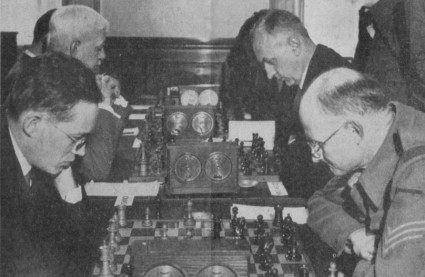
CHESS, December 1945, page 54
When commenting in C.N. 3606 that Brian Reilly was perhaps the best of all the BCM editors, we had in mind not just his own writing but his skill in assembling, and maintaining over the decades, some outstanding contributors. There were, for instance, frequent book reviews by not only J.M. Aitken but also W.H. Cozens, W. Heidenfeld, D.J. Morgan and, indeed, G.H. Diggle himself.
Addition on 19 October 2024:
G.H. Diggle’s article on Jackson Whipps Showalter now appears in our feature article on Showalter.
The final paragraph of the Preface to the second volume of Chess Characters:
‘The BM thanks all his readers for their “kind patronage” over the years, and in particular some really eminent ones who, though he has sometimes poked fun at them, have greeted his efforts from time to time with “encouraging noises”. Not to be forgotten either are the two great pillars of the old Newsflash, Ann Hopton and Paul Buswell, and the succession of unknown heroines who have deciphered and typed the BM’s “copy”, having even been known on occasion to “tart up the old chap’s spelling”.
G.H.D.
March 1987’
G.H. Diggle’s article below (BCM, January 1955, pages 34-36) is a pre-eminent example of anaphora in chess literature:
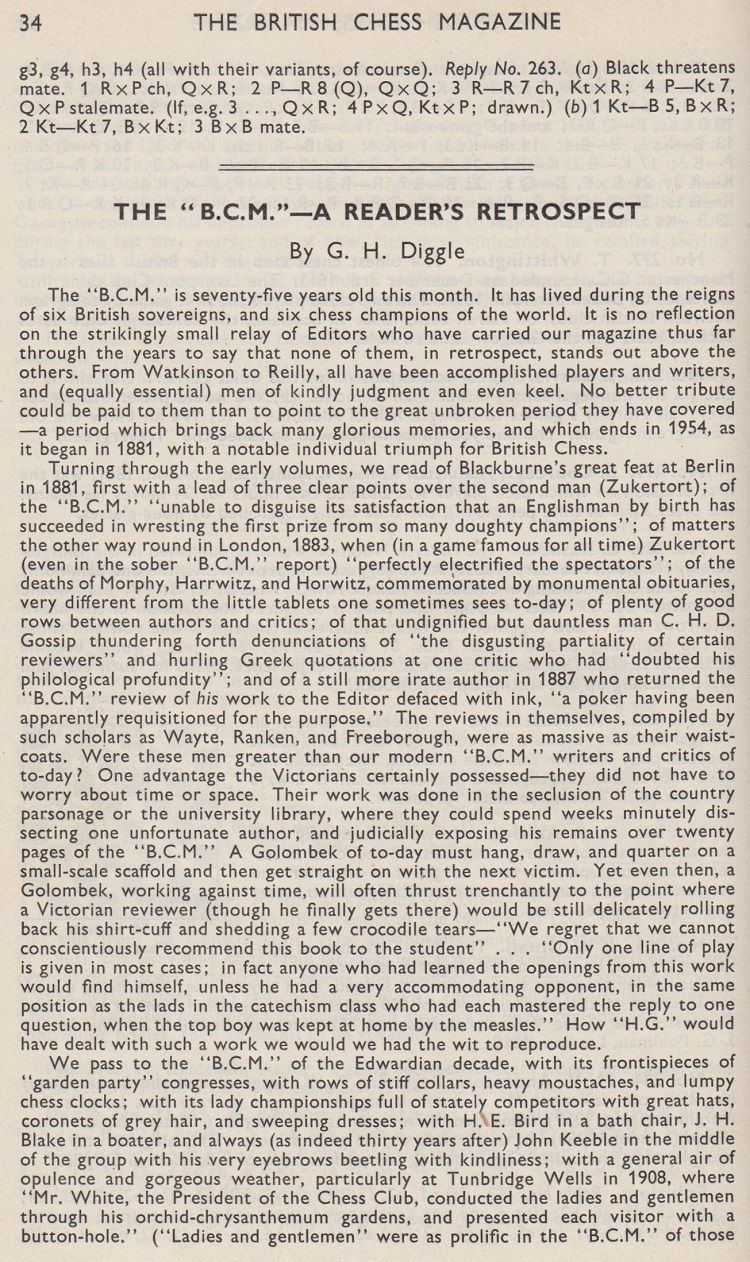
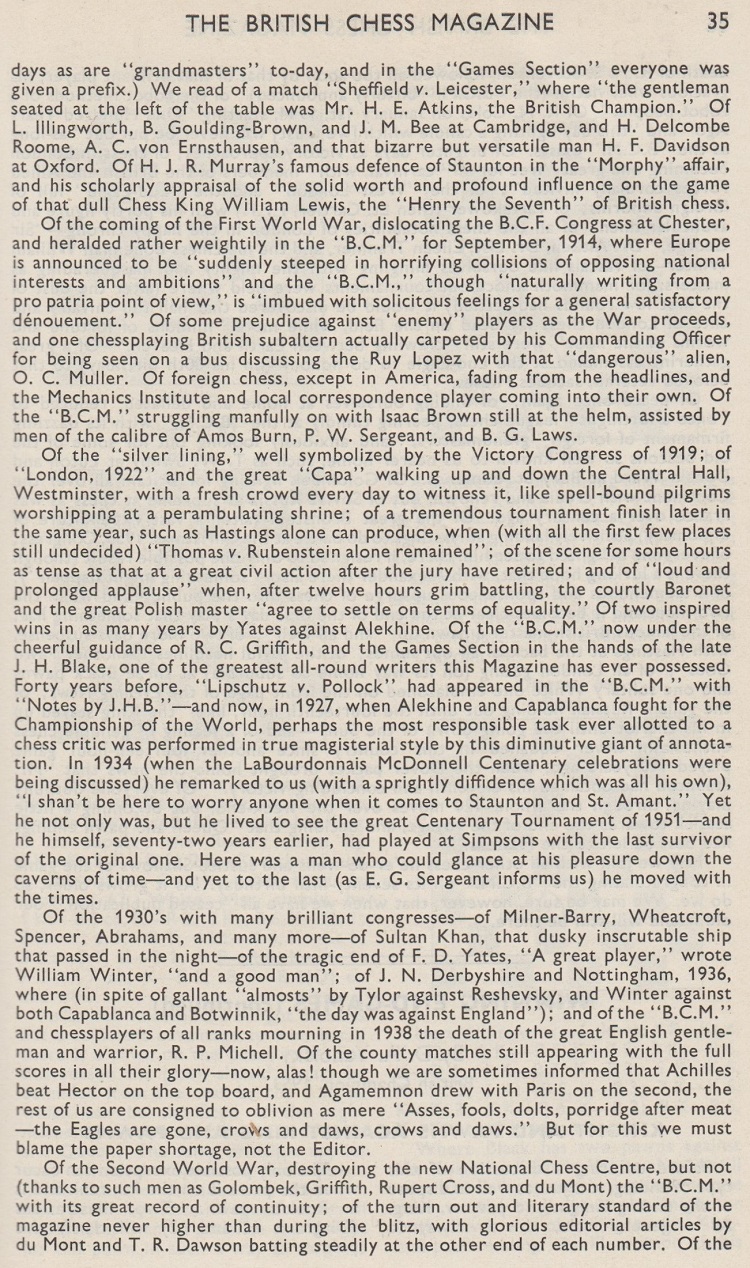
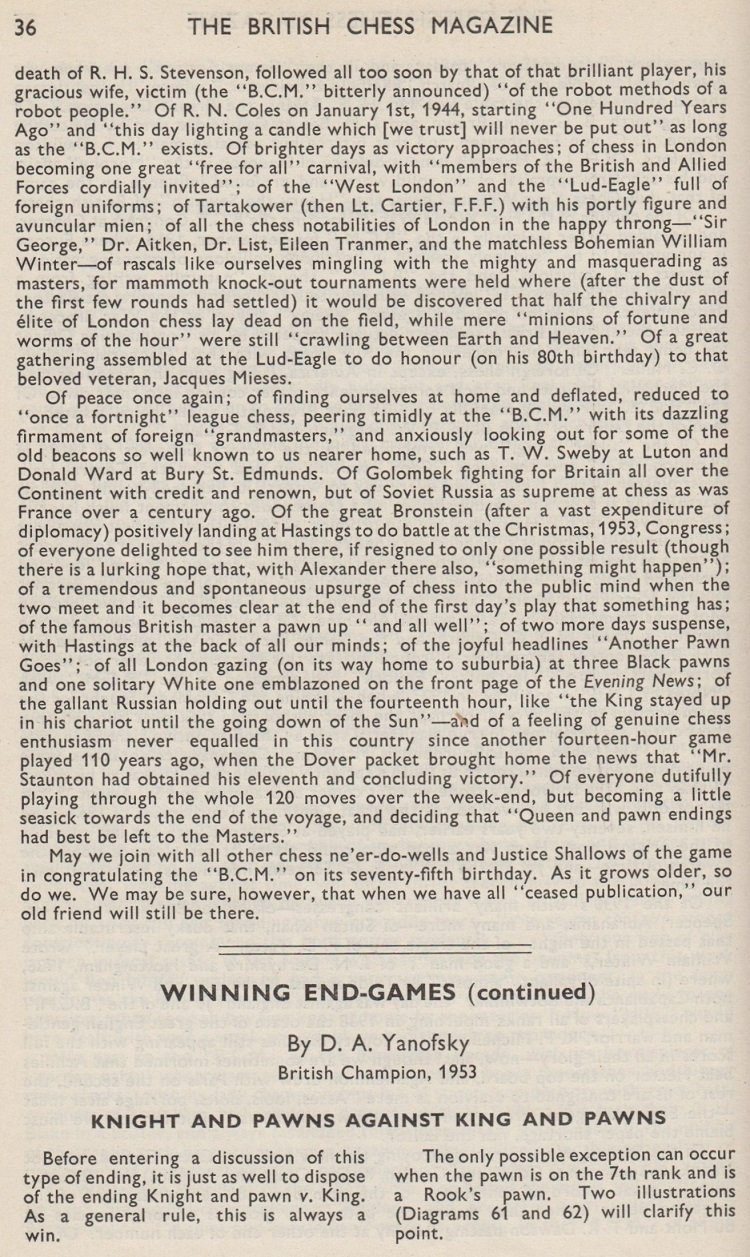
Concerning page 34, the ‘still more irate author’ (in 1885, not 1887) was Thomas B. Rowland, who had co-authored Chess Fruits with Frideswide F. Rowland. Following publication of the first part of an anonymous review on pages 147-149 of the April 1885 BCM he wrote in to denounce ‘the most extraordinary and injurious article you have published under the heading of a Review. The writer was evidently mad or drunk’.
Among the magazine’s comments in reply:
‘By the same post came back our April number with the pages containing the review defaced with ink, the end of a poker having apparently been “requisitioned” for the purpose.’
Source: BCM, May 1885, pages 191-192.
(11353)
The words of G.H. Diggle on pages 635-636 of the December 1980 BCM:
‘[In 1865] Staunton (over a decade after his retirement from the Chess Player’s Chronicle and a quarter of a century after launching the magazine) suddenly reappeared as Editor of a new periodical – the Chess World. But both the actual “Chess World” and Staunton himself had aged since he brought out his first number of the Chronicle. Then he was a young and adventurous pioneer, the hero of adventurous followers – now, a long deposed and ailing monarch. Though actually only 55 years old, his heart trouble frequently forced him to lay aside his pen; and the frustration caused by his physical state being no longer able to cope with the demands of his vigorous intellect had turned him into something very like Henry VIII in his last phase. While he could still comment on occasion with shrewdness and penetration on the chess affairs of the day (in particular the Steinitz-Anderssen match of 1866) he became more and more caustic and unfair to the younger generation, both in the Chess World and his weekly Illustrated London News column.’
(2891)
From an article by G.H.D. on pages 184-187 of the July 1958 BCM:
‘Though himself the last of the romantic world champions, Morphy by his victories swept away for ever many of the romantic myths and obsolete beliefs that had long obsessed a chess world which was always living in the past. Prior to his advent, it had always been held that no chess generation could ever be as good as the previous one – no champion as strong as his predecessor of 20 years back. Staunton might be “worthy to succeed McDonnell”; McDonnell “might have almost aspired to play with Mr Lewis”; Labourdonnais might have “become too strong to receive the ‘pawn and two’ from his chess-master Deschapelles” – but it never seemed to occur to anyone that the younger player could really have knocked the old one’s head off. Had “grandmasters” been invented in those days, they would have qualified for that elephantine title only by having been dead for at least 25 years, or by having successfully evaded all challenges after negotiations dragged out for a similar period. Morphy finally disposed of this cult, and it was at long last realized by writers like Walker that a champion had arisen who might possibly be superior to Philidor.’
(2896)
Regarding titles, on page 4 of the January 1981 BCM G.H. Diggle wrote:
‘Staunton, though he had his faults, would have cut his throat before penning the hideous expression “grandmaster norm”. He would have seen at once that the second word reduced the glory of the first to a meaningless nothing.’
(6625)
G.H. Diggle was a permanent subscriber to Chess Notes, and the first of his many contributions was in C.N. 300, concerning the death of St Amant. In C.N. 1605 (also on-line as C.N. 5061) he wrote an article about Reginald Pryce Michell. G.H.D. furthermore played an important part in the Debate on Staunton, Morphy and Edge in the 1980s, right through to the magazine’s final issue (December 1989), to which he contributed over 2,000 words.
G.H. Diggle on page 4 of the BCM, January 1981:
‘Chess news is one long traffic jam, which editors find it almost impossible to contain or handle.’
(11589)
In a letter dated 3 March 1993, Anthony Diggle informed us of his father’s physical decline in the final weeks and added:
‘The flesh may have been weak, but the spirit was willing right to the end: he remained in full possession of his faculties until the last week, when exhaustion finally overtook him.
His letter to you on 4 February was, I believe, his last. As you know, never for one moment did he lose interest in any matter to do with chess. The acknowledgement of his last birthday in “Quotes and Queries”, BCM, December 1992 itself acknowledged his pointing out of an error in the Spassky-Fischer notes to Game 2 in their recent rematch, as no doubt you saw. Naturally he followed keenly the Short-Timman match, predicting correctly that Short would win.’
G.H. Diggle regularly sent us cuttings from the Daily Telegraph chess column of Nigel Short, whose writing he held in high regard.
Below are the last two letters that we received from G.H.D. The second one was written nine days before he died.
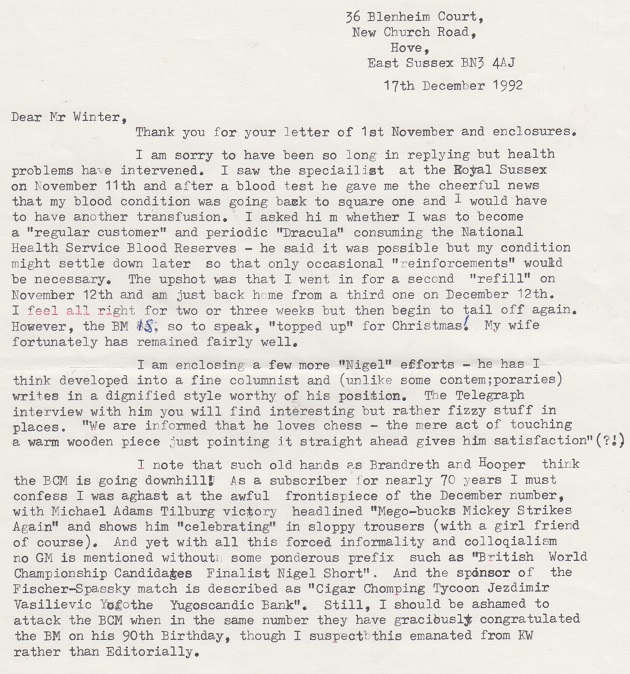
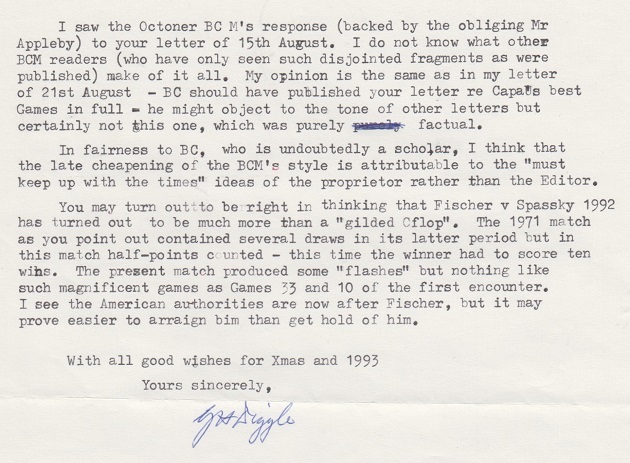
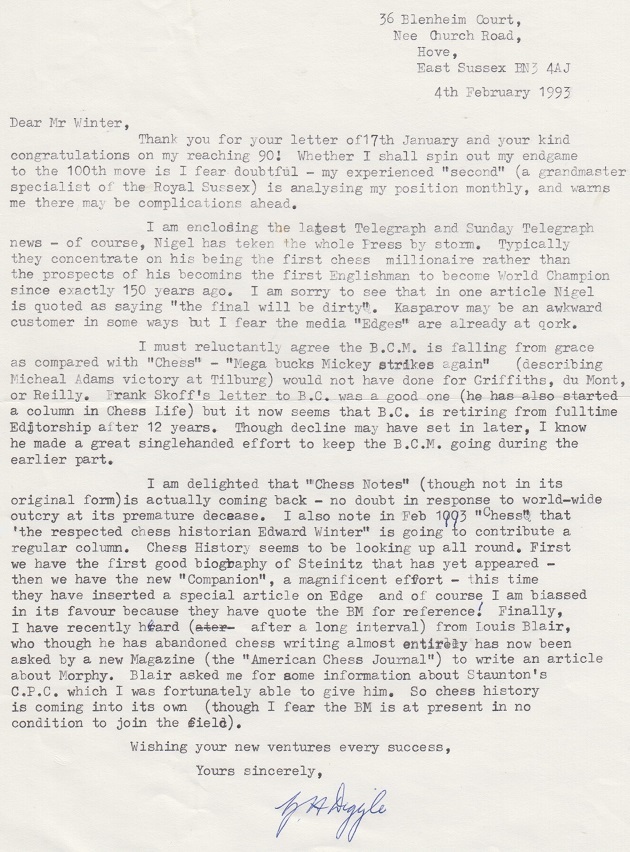
(11839)
Also concerning Nigel Short’s Telegraph column, G.H.D. had written to us on 25 August 1992:
‘I think he shows very impressive depth in his general comments, and is “well read” besides.’
(In a Badmaster article (reproduced in C.N. 7089) he described playing against Nigel Short in a simultaneous exhibition in 1978.)
In the same 25 August 1992 letter he commented on the recent death of Mikhail Tal:
‘Tal seems to have inspired more genuine affection from the international chess circuit than any previous master since Anderssen.’
On 3 September 1992 G.H. Diggle wrote to us:
‘I saw the “exciting” cover “Bobby’s back” on latest BCM. Everything has got to be a sensation nowadays and the BCM must “get there first” with it. ... And, incidentally, Bobby is back!! I enclose the Daily Telegraph’s cuttings – alone of our Dailies they made it front page news. Bobby’s first public words at the Press Conference should be immortal: “Uh, naw, I wanna choose the questions!”’
Elsewhere in the same letter:
‘I remember writing my first historical letter in the BCM, in 1926, and E.S. Tinsley promptly “sat on me” in a private letter from The Times.’
See François-André Danican Philidor.
Working backwards through the files, we come to this observation in a letter from G.H.D. dated 6 August 1992 (concerning a feature about Reshevsky in New in Chess):
‘I enjoyed reading Hanon Russell’s very fine tribute to Reshevsky – obviously, sincere, and I have seldom seen so much information packed in so readably into his first three short paragraphs. He reveals that Samuel was a much nicer character than was the general view – he may have had few friends but they were real friends.’
On 17 March 1992 he commented to us:
‘Dr Nunn’s article in New in Chess [in the 1/1992 issue, concerning the 1991 English Championship] was one of the best I have read for a long time; he depicts the shoddy discomfort of the Knockout Tournament brilliantly and with a quiet underlying sarcasm.’
A paragraph from a letter written to us on 20 January 1992:
‘I don’t know about being one of the best chess writers of your vast acquaintance, though I am one of the few who has written about local chess heroes (and eccentrics) as well as Grandmasters. But the two greatest writers of my type so far this century are, I think, the late Brian Harley and Bill Hartston.’
In the same letter, G.H. Diggle commented on an article about Raymond Keene by Jeff Powell (Daily Mail, 14 October 1991, page VIII):
‘I have seldom read such dreadful stuff.’
From a letter written on 27 October 1990 concerning the Bandung Limited television production The Sultan of Chess broadcast by Channel 4 in the United Kingdom on 19 September 1990:
‘I unfortunately missed the Sultan Khan programme through my own fault in not looking out for it properly in the Radio Times. But I was gratified to hear your praise of the portrayal of William Winter, because some months ago Michael Wagstaff, one of the compilers of the film, called on me (K.W. having mentioned my name to him) and asked me a number of questions about the Sultan Khan epoch, as, for example, “Could I tell him anything about the personality, habits, and mannerisms of William Winter?” I told him about his conversational powers and staccato voice and his demeanour at the Chess Board – he always sat with his left arm folded tightly across his chest, rather like some portraits of Napoleon. If the film brought this out, I shall of course take all the credit!’
On 30 September 1990 he forwarded us a number of Daily Telegraph columns by David Spanier and commented:
‘Some of his notes attempt to match Bobby Fischer’s style – but Bobby's “slang” always made some true point. Such notes as Spanier’s “Nice work, Gata!” get us nowhere.’
In a letter dated 4 March 1990 G.H.D. Diggle offered some personal comments arising from our Capablanca monograph, which had just been published. (He later adapted some of the letter into a book review on page 12 of the January 1991 Chess Moves.)
‘Many parts of the book brought forth nostalgic memories. I well remember, as a Capa fan, devouring his Times reports of the London, 1922 Tournament, given in Chapter 6. And I watched the whole of Vidmar v Capa (Nottingham, 1936) given on page 281. Capa had then a pale rather than an olive complexion, and his left eye seemed slightly inflamed; still, he was jaunty. For some reason the game was played on a rest day when none of the other masters were on show. Vidmar took most of the time while Capa walked briskly up and down chatting with Znosko-Borovsky, who was reporting but not playing in the Tournament. When V. resigned the three had a very amiable inquest, though they grunted and pointed to squares rather than talked, V. thinking he could have saved the game but Capa “grunted” negatively. Also on page 304 (Compendium) Capa says “At the adjournment of my last game at Nottingham with Bogoljubow ... I analysed the position ... forgot all the analysis ... as if a sponge had soaked up my ideas”. As once reported in “Badmaster”, I actually saw him analysing (through an open door marked “Players only”) – he seemed somewhat agitated and banged the pieces about at a furious rate. He claims that had he remembered his analysis he would have won instead of drawn, but there is nothing in the Tournament Book Notes to confirm this.W.H. Watts (whom I knew well) was very proud of his simul win against Capa at Hastings (score on page 99). He took care to publish it in Chess Pie, 1922. Also on page 99 I was very interested to see that E.S. Tinsley (Chess Editor of The Times) achieved a draw against Capa in a simul at the “Gambit”. Watts and other players always derided Tinsley as a pompous old bluffer, (incompetent both as a player and as an annotator) who lived on his eminent father’s reputation. But his chess cannot have been all that bad, unless “Capa” went easy against him, which I would very much doubt, though Tinsley was on friendlier terms with him than was any other British journalist, and always lauded him to the skies in his Times reports.
The book might have been entitled “A Compendium of Capa Common Sense” but for the joker in the pack – i.e. Chapter 8, embodying Capa’s strange mania for “Changing the Rules” and landing us with a larger board and weird new pieces; as Will Lyons put it “erecting mental skyscrapers”, and William Winter “turning all the smaller pieces into cannon fodder”. An extraordinary lapse into eccentricity for a man of Capa’s well regulated mind.
Throughout his articles and correspondence Capa’s style of writing comes out crystal clear if colourless. He uses fewer multi-syllable words than any other master I have read except Fischer; and he has a splendid understanding of the mental calibre of the “patzers” for whom he is writing – he never seeks to overawe them by writing above their heads. At times he is almost needlessly explicit. On page 283 he points out a “fundamental difference” between Tournaments and Olympiads, where “what counts is not only the result of the top player but the total of each of the team members’ scores. ... the first board player might win all his games yet his team might finish bottom.” Even “Badmaster” could have worked this out for himself!
Was Capa vain? I think his writings about other masters quoted in the Compendium were sometimes tactless and gave the impression of ungenerosity – for example, when Marshall came above him at Havana, 1913 there was no need for Capa to write that it was luck “on a scale that had never been seen before ... and not deserving more than fourth place he finished first. I do not believe that readers will think that I am trying to belittle Marshall’s performance.” (!!) Yet I have no doubt that Capa genuinely believed what he wrote, and may well have been right. His writings show throughout that he had a deep inner certainty that he and Dr Lasker were in a class by themselves, and that any game he lost to anyone else must have been due to his own play going temporarily out of order, like a clock striking 13 instead of 12, rather than that his opponent could possibly have risen for the moment to his own stature. I think Morphy had the same feeling (though he kept more quiet about it) after losing his first game with Harrwitz.
Chapter 10 (negotiations with Alekhine) I had to go through twice, not taking it all in the first time. It is a motorway of small print (with side roads – Lederer, Rueb etc. intervening) along which one must drive carefully before reaching a conclusion. There were faults on both sides, (Capa’s “whereas” list could have been dispensed with) but on the whole he comes out better. Alekhine’s first letter of all (29 February 1928) suggests a writer who is digging in for negotiations which he means to last a very long time. Capa rather imprudently sending him a copy of his letter to Dr Rueb with general ideas about regulations for future Championships gave Alekhine the chance to pretend to think that C. was trying to alter the terms for their return match. Again, Alekhine in two instances fixed reasonable looking dates and reasonable looking venues in themselves, taking care that taken together they made matters impossible for the organizers and fund raisers!’
As shown in C.N. 11853, G.H. Diggle found that Tinsley had missed a win against Capablanca in their 1919 game.
The Badmaster column which discusses Capablanca v Bogoljubow, Nottingham, 1936 is in C.N. 7102.
Concerning Emanuel Lasker, the 1933 BCM debate about the Manual of Chess included a contribution from Diggle. See Dr Lasker’s Chess History.
G.H. Diggle’s article on R.P. Michell (C.N. 1605 – see too C.N. 5061) stated that, prior to the last round of Hastings, 1934-35, Sir George Thomas was alone in the lead, ahead of Capablanca, Lilienthal, Botvinnik, Euwe and Flohr, and that ...
‘... only the two last-named could overtake him if he lost.’
In C.N. we amended that to read:
‘... only Euwe could overtake him if he lost.’
Our correspondence with G.H. Diggle included the following linguistic discussion:
E.W. to G.H.D., 18 May 1988:
‘After last writing to you it suddenly struck me that the passage about Hastings, 1934-35 required slight amendment because Flohr would not have been able to overtake Thomas in the final round. I don’t like tampering with contributors’ texts without prior agreement, but you’ll appreciate that in this case there was no time to discuss it with you.’
G.H.D. to E.W., 26 May 1988:
‘As regards Hastings, 1934-35 the score at the end of the penultimate round was Thomas 6½, Euwe 6, Flohr 5½. According to the Oxford Dictionary, “overtake” means “come abreast with”, not “go ahead of”, so I think that for once I was right on a point of detail! Flohr as well as Euwe could have caught him up.’
E.W. to G.H.D., 4 June 1988:
‘I’m sorry that there wasn’t time to check with you about Hastings 1934-35. Your point about the correct meaning of “overtake” came as a great surprise to me; it is not the kind of word I would ever have thought of checking in the dictionary.
Well, I’ve consulted a variety of reference works. One gave only the meaning you suggest, but all the others gave both “your” meaning and “mine”. I also checked with a number colleagues (either of English mother tongue or else expert foreign speakers). All spontaneously said that “overtake” could only mean “to catch up on and go past”.
I feel sure that this is how almost everybody uses the word nowadays. Imagine, in motor-racing, that driver A is just a few metres ahead of driver B towards the end of the final lap. But then driver B overtakes driver A. Who has won the race? To me there is no doubt: driver B. Would you say the race was a tie?!
In any case, if you would like me to include a correction in issue 40, perhaps you could kindly let me have a few lines.’
G.H.D. to E.W., 17 June 1988:
‘I do not think we need worry about making any correction as it appears the lexicographers themselves do not agree on the exact meaning of “overtake” so we may both be right!’
From a letter dated 17 June 1988:
‘I am a very slow writer – some of my short Badmaster pieces took me seven or eight hours (checking for the right facts and the right adjectives and adverbs) – in my last bit about Michell [C.N.s 1605 and 5061] I would take ten minutes over one word deciding whether the “lounge lizards” were “saturated” with sadistic expectation or “bristling” with it.’
On 19 April 1988 G.H. Diggle wrote to us:
‘Kasparov seems a “compulsory self-contradictor”. I do not think he is solely to blame – the World Press have so danced attendance on him and pressed him to open his mouth so frequently and so rapidly that since becoming world champion he has already said and written more than most of his predecessors ever said in 20 years. With the pace so hot, contradictions are bound to creep in (or pour out!). I agree that there is a general feeling that stopping the match was not such a crime after all. From Kasparov’s point of view, 0-0 was a better prospect than 3-5.’
On David Spanier’s chess column in the Daily Telegraph (letter from G.H.D. dated 22 March 1988):
‘It is possible that he does “get help with his homework” in annotating games – but this is far less reprehensible than some Editors of the past who (though Badmasters themselves) inflicted their own annotations on the public. E.S. Tinsley of The Times was a notorious case, though he never went deep enough to be inaccurate – often he only annotated right at the end – 36 Resigns. Otherwise QxQ mate.’
On 15 February 1988 G.H. Diggle informed us, having just received the January and February 1988 issues of Chess Life, that he was ...
‘... alternately appalled and fascinated by that periodical. ... “FIDEGATE REVISITED”, in which ten belligerents (if I have counted right) throw stale custard pies at each other (strewn at intervals over the Jan. Feb. pages), consists mainly of re-raked “old hat”. And why can’t the Editor put it all in one place, instead of causing the reader to continually lose his thread by fumbling from one page to another seven pages on?
“Redman’s a rogue, as you will see
When you have read page 53
Campo will never go to Heaven
But please turn to page 57
R.K. sounds plausible, but wait
Till you have seen page 68.”’
Some comments about the Ricardo Calvo Persona non Grata affair were given by G.H.D. in a letter to us dated 29 January 1988:
‘I have studied Dr Calvo’s article. He frankly says, “I have no pretention of objectivity”. Nor is he always very informative – with the Chilean Chess President we are informed he had “a long and disgusting discussion” and “about Colombia I would prefer not to talk”. He frequently alludes to “pro-Campomanes men” as though they were an unpleasant species of the human race. Speaking as an ignorant layman, my impression of Campo is that of a man of great energy who gets things done and occasionally pulls fast ones, but scarcely a sinister figure supported by a sort of mafia. In Ecuador Dr C. learned “with horror that the man in charge had spent in Guayaquil three days and three nights with Campomanes the year before”. Again, in Venezuela “a pro-Campomanes man” beats up his rival President, “a delightful old woman” – it may indeed have happened, but Campo cannot help all that goes on in Latin America.
Dr Calvo’s last two paragraphs are by far the best ones. They ring true and give a striking picture of chess organization struggling in Third World Countries where delegates will do anything and vote for anyone who will get them away, even temporarily, “from their unhappy surroundings”. No doubt in the late election there must have been some actual (or at any rate indirect) bribery on both sides. Dr C. himself makes no bones about the offer of Kasparov “simuls”.’
Below is an extract from G.H. Diggle’s letter to us of 23 July 1987:
‘It is of course possible for a man to feel “pressure” without being either openly or covertly intimidated by anyone. I myself was once angered by reading a shockingly-researched attack on Staunton by F. Reinfeld, and felt like writing to the BCM and shooting him down in flames. But I refrained. Why? Because he had just reprinted (with an adulatory comment) an extract from an article of my own on Labourdonnais-McDonnell, and I did not want to appear churlish. Deplorable dereliction of duty on my part, you will say. Yet such is the weakness of human nature!’
The material reprinted was on pages 69-75 of The Treasury of Chess Lore by F. Reinfeld (New York, 1951).
A remark about David Spanier’s chess column in the Daily Telegraph, from G.H.D.’s letter of 4 March 1987:
‘The other day he used the expression “grandmasterly”, which upset me for the rest of the day.’
On 2 September 1988 G.H. Diggle also drew our attention to the adjective ‘grandmasterly’ in a chess report by Malcolm Pein on page 13 of the Daily Telegraph, 13 August 1988.
For further comments on that report, and on the topic more widely, see Chess Grandmasters.
From a letter dated 1 December 1986:
‘The Badmaster, though he is trying to “fade away quietly”, has been invited to send a Christmas Message to the readers of the new Newsflash – but this will only be a “flash in the pan”. A far more important “demise” (unless the powers that be bow to public outrage) is that of Dr John Nunn’s Illustrated London News column, which is being discarded after running for over 120 years.’
On 2 August 1986 G.H. Diggle wrote to us:
‘You will have seen that Newsflash in its old form has come to an end and so the Badmaster is now retired. Paul Buswell wrote me a very nice letter – he also had a chat with Mr Cafferty who actually offered the BM a monthly niche in the BCM itself, but after much thought I declined. Though in fairly good health I am now in my 84th year, and thought it would be a mistake to launch myself as a novelty in the BCM and then have to give up in a year or so.’
In the 1980s G.H. Diggle sent us a copy of a letter which he had written to David Lawson on 9 June 1977 after perusing Paul Morphy The Pride and Sorrow of Chess:



Below are some cuttings from a local newspaper of the 1920s, when G.H.D. was still living in Lincolnshire:

1 e4 e5 2 Nf3 Nc6 3 Bb5 a6 4 Ba4 Nf6 5 O-O Be7 6 d3 b5 7 Bb3 d6 8 Ng5 O-O 9 f4 h6 10 Nf3 Na5 11 fxe5 Nxb3 12 axb3 dxe5 13 Nc3 Bc5+ 14 Kh1 Ng4 15 Qe2 Qd6 16 Nxb5 Qb6 17 d4 exd4 18 Qd3 Bd7 19 Nbxd4 Rfd8 20 h3 Bb5 21 c4 Bxd4 22 Nxd4 Ne5 23 Qg3 Qxd4 24 cxb5 Rd6 25 Ra4 Qd3 26 Qxd3 Nxd3 27 bxa6 Rc6 28 Ra1 Nxc1 29 Rfxc1 Raxa6

30 Rxa6 Rxc1+ 31 Kh2 Re1 32 Rc6 Rxe4 33 Rxc7 f6 34 Rb7 Re3 35 b4 Rb3 36 b5 Kf8 37 b6 Rxb2 38 Kg3 Rb4 39 Kf3 Ke8 40 Rxg7 Rxb6 41 Rg6 Kf7 42 Rxh6 Rb4 43 g4 Kg7 44 Rh5 Kg6 45 Rc5 Rb3+ 46 Kg2 Rb2+ 47 Kg3 Rb3+ 48 Kh4 Rf3 49 Rb5 f5 50 g5 Kh7 51 Rb7+ Kg6 52 Rb6+ Kh7 53 g6+ Kg7 54 Kg5 Rxh3 55 Rb7+ Kh8 56 Kf6 Resigns.

1 e4 e5 2 Nf3 Nc6 3 d4 exd4 4 Bc4 Nf6 5 e5 d5 6 Bb3 Ne4 7 Nxd4 Qh4 8 Be3 Bg4 9 Nf3 Bxf3 10 gxf3 d4 11 e6 O-O-O 12 fxe4 Qxe4 13 O-O dxe3 14 Qe1 Qg4+ 15 Kh1 Qf3+ 16 Kg1 e2 17 White resigns.

1 e4 c5 2 Nf3 d5 3 Nc3 dxe4 4 Nxe4 b6 5 Bb5+ Bd7 6 Qe2 a6 7 Nd6 mate.


White to move
1 Rf5+ Kh4 2 Rf4+ Kg5 3 Rg4+ Kh6 4 Qf8+ Kh5 5 Nxf6 mate.
A computer check shows a forced mate in eight moves beginning with 1 Qe6.
An endgame study by Diggle was published on page 42 of the Chess Budget, 11 November 1925:
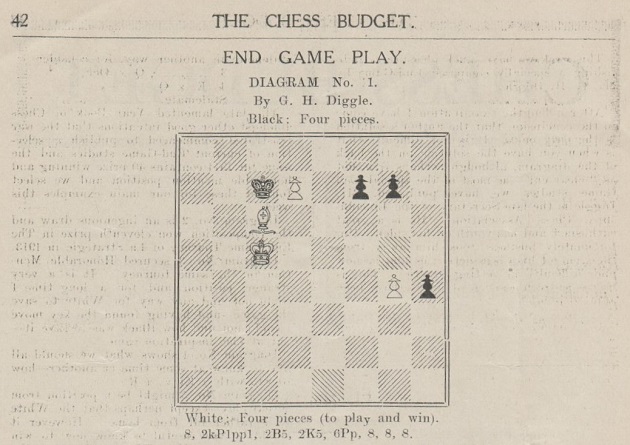
The composition was discussed by K. Whyld on page 442 of the August 1993 BCM with this misleading comment:
‘... the Chess Budget, which, unlike “Badmaster” himself, had a brief life. So brief in fact that the solution was never published.’
The very rare Chess Budget continued to be published regularly (weekly) after issue 35 had printed Diggle’s study. We have a run of the next 19 issues (36-54, from 21 November 1925 to 17 April 1926). Although the solution to the Diggle study is not there, the last issue in our collection tantalizingly gave (i.e. on page 197 of issue 54) a full page of solutions to compositions published throughout much of 1925, and the Editor, W.H. Watts, concluded:
‘This brings the solutions up to the end of September [1925]. In our next issue we hope to give a further batch, and subsequently to publish the solutions once a month.’
Was the solution to the Diggle endgame given in any of the three final issues (55, 56 and 57) of the Chess Budget which are mentioned in reference works (e.g. Betts’ Annotated Bibliography)?
Those sources state that the Chess Budget ceased publication with issue 57 on 16 October 1926. The fact that issue 54 was dated 17 April 1926 indicates that the schedule was badly delayed and disrupted towards the end. W.H. Watts’ inability to save his magazine was discussed by Diggle in an article reproduced in C.N. 5316.
(9079)
We are grateful to the Koninklijke Bibliotheek in The Hague for checking the three final issues of the Chess Budget (1926). None of them contained the solution to the study by G.H. Diggle.
(9093)
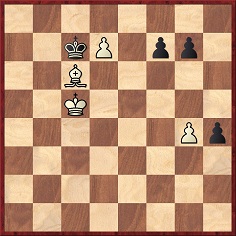
White to move and win
From John Nunn (Chertsey, England):
‘The Diggle study has multiple solutions. Black can never take the white bishop, even when his pawn is on h2, because of the diagonal skewer Qa8+. Therefore there is no rush for the white king to head to the kingside, and in fact any king move wins. There are also other winning possibilities; for example, 1 g5 h3 2 g6 fxg6 3 Kd5 h2 4 Ke6 Kd8 5 Kd6 g5 6 Bh1 g4 7 Bg2 g3 8 Bh1 g5 9 Bg2 g4 10 Bd5 g2 11 Bxg2 g3 12 Ke6, or even 1 d8(Q)+ Kxd8 2 Kd6 h3 3 Bd7 h2 4 Bc6, and Black will soon be forced to play ...Kc8 and allow the white king to penetrate to e7.’
(9099)
Our feature article on R.N. Coles includes G.H. Diggle’s tribute to him, first published in Newsflash in June 1982 and reproduced on page 82 of Chess Characters (Geneva, 1984).
To the Chess Notes main page.
To the Archives for other feature articles.
Copyright: Edward Winter. All rights reserved.